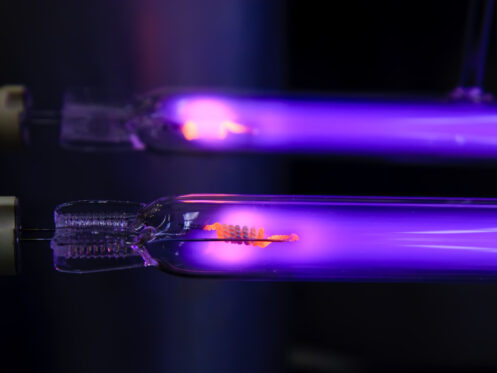Indoor air quality (IAQ) is a crucial factor for homeowners seeking to create a healthy and comfortable living environment. The quality of the air we breathe inside our homes can significantly impact our overall health, especially when it comes to respiratory issues and allergies. In this comprehensive guide, we’ll delve into the importance of IAQ, the key factors affecting it, and, most importantly, how UV lights play a powerful role in enhancing it.
What is IAQ and Why is it Important?
IAQ refers to the quality of indoor spaces. Poor IAQ is often linked to a variety of health problems, including headaches, allergies, respiratory issues, and even long-term conditions such as asthma or chronic obstructive pulmonary disease (COPD). Given that the average person spends about 90% of their time indoors, the air quality within your home can greatly affect your well-being.
Key pollutants that commonly affect IAQ include:
- Dust and allergens (pet dander, pollen)
- Volatile organic compounds (VOCs) from household cleaning products and building materials
- Microbial growth
- Bacteria and viruses
- Smoke and carbon monoxide
While proper ventilation, air filtration systems, and regular cleaning are all crucial for maintaining good IAQ, one of the most effective technologies in fighting harmful airborne contaminants is UV light purification.
How UV Lights Improve IAQ
Ultraviolet (UV) lights are an advanced and highly effective technology used to eliminate airborne pathogens, mold, bacteria, and viruses. UV lights, specifically UV-C lights, have been used in hospitals and medical facilities for years as a way to sterilize equipment and sanitize air. Now, homeowners are increasingly using UV lights in HVAC systems to help improve IAQ and maintain healthier environments.
How Do UV Lights Work?
UV-C light, a short-wavelength ultraviolet light, has germicidal properties that make it effective in disrupting the DNA of microorganisms. When installed in an HVAC system, UV lights are strategically placed near the coil or in the ductwork to destroy mold, bacteria, and other pathogens as air passes through the system. Here’s how the process works:
- Direct Exposure: As air circulates through your HVAC system, the UV-C light directly targets and neutralizes airborne microbes.
- Reduction of Mold Growth: UV lights are especially effective at preventing mold and mildew from developing on your HVAC system’s coils, which can be a common source of allergens and poor air quality.
- Continuous Air Cleaning: Unlike air filters, which trap particles, UV lights actively destroy microorganisms, ensuring cleaner air every time the HVAC system is running.
Benefits of UV Lights for IAQ
When it comes to improving IAQ, UV lights offer several significant benefits:
1. Eliminates Harmful Microorganisms
One of the key benefits of UV lights is their ability to kill or neutralize harmful airborne pathogens, including bacteria, viruses, and mold spores. This can be particularly beneficial during flu season or times when colds and other viruses are spreading.
2. Reduces Mold Growth
Mold thrives in warm, moist environments, and your HVAC system’s coils are a prime breeding ground for it. Mold growth in your HVAC system can release spores into the air, which can trigger allergies, asthma, and other respiratory problems. UV lights help eliminate mold growth, ensuring cleaner air and a healthier home.
3. Improves HVAC Efficiency
When mold and other debris accumulate on your HVAC system’s coils, it can reduce efficiency and cause the system to work harder to maintain the desired temperature. By using UV lights to keep the coils clean, you can maintain better HVAC efficiency, lower energy bills, and extend the lifespan of your system.
4. Decreases Allergens
UV lights target bacteria, mold, and other allergens that contribute to poor IAQ. By reducing these allergens, UV lights can help alleviate symptoms such as sneezing, coughing, and itchy eyes, especially for people with allergies or respiratory conditions.
5. Odor Reduction
Because UV lights help reduce the growth of mold and bacteria, they can also help eliminate the musty or stale odors that these microorganisms often cause. Cleaner air is often fresher-smelling, making your home feel more pleasant and inviting.
Installing UV Lights: What to Know
Installing UV lights in your HVAC system is an effective way to improve IAQ, but it’s important to consult with a professional HVAC technician to determine the best solution for your home. There are a few key considerations when installing UV lights:
1. Placement
UV lights should be installed in areas where they can effectively target the highest concentration of microorganisms, such as near the evaporator coils or within the ductwork. A professional technician will know the optimal placement for maximum efficiency.
2. Maintenance
While UV lights are low-maintenance, the bulbs do need to be replaced periodically to ensure they remain effective. Most UV bulbs last between 9-12 months, so it’s essential to schedule regular maintenance to replace the bulbs as needed.
3. Compatibility with Your HVAC System
Not all HVAC systems are the same, so it’s important to ensure that UV lights are compatible with your specific system. A professional HVAC technician will assess your system and recommend the appropriate UV light setup.
UV Lights vs. Air Purifiers: What’s the Difference?
While both UV lights and air purifiers can improve IAQ, they work in different ways. Air purifiers typically use filters to trap particles like dust and pollen, but they don’t actively kill bacteria or viruses. UV lights, on the other hand, actively destroy harmful microorganisms at a molecular level. For comprehensive IAQ improvement, many homeowners choose to combine both technologies, using UV lights to neutralize pathogens and air purifiers to trap particles.
UV Light Experts
Improving IAQ is essential for maintaining a healthy and comfortable living environment, and UV lights offer a powerful solution for homeowners looking to reduce airborne contaminants. By installing UV lights in your HVAC system, you can effectively eliminate harmful pathogens, reduce allergens, and improve the overall efficiency of your system. For the best results, be sure to consult with a professional HVAC technician to determine the right UV light solution for your home.
